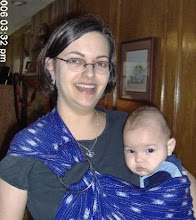In New York, a Nurse-In was planned this week after a woman at the Longwood Public Library was asked to "cover up":
New York State law on breast-feeding established in 1992 "guarantees a mother the right to breast feed her baby in any location, public or private, where the mother is otherwise authorized to be, irrespective of whether or not the nipple of the mother's breast is covered during or incidental to breast feeding."
"I explained to her I wouldn't cover up and that she was being unlawful," Ms. Neary-Wood said. "I told her that now when people complain [about women breast-feeding in the library], she'll have something to tell them and no other woman will be harassed or asked to leave a program."
Library director David Clemens told The Sun Thursday "the library follows the law."
But Ms. Neary-Wood and friend Kristen Ferrara of Rocky Point, who was also breast-feeding at the class, say that's not what Mr. Clemens told them June 30.
The two allege Mr. Clemens told them "we don't have to follow the law" and that the public library is "not a public place." His explanation of this statement, they say, is that the library is governed by a board of directors.
In Buda, Texas, Breastfeeding fans still want apology:
During the citizen comment period, Michelle and Jason Hickey and many others spoke about the breastfeeding incident at Kyle Pool.
"All my wife was doing was breastfeeding her child," Jason Hickey said. "The people that were involved basically looked for a reason to tell my wife, 'Oh, you were in the wrong,' when she was never in the wrong."
At least five other citizens said they felt Hickey was treated unfairly and deserved an apology.
And close to home, a Dallas mother was kicked out of Gutmann's Home Furnishings on Inwood Road for breastfeeding. Worse, when she called the police, the officer sided with the furniture store owner. The Dallas Police Department is reviewing the case. A Nurse-In took place on Saturday, and you can watch the Fox News Broadcast online. Double kudos to Fox4 News for not only showing the mom discreetly breastfeeding, but also for quoting the Texas statute in their coverage.
Related post: Lactivism, Nurse-ins, and Victoria's Secret




